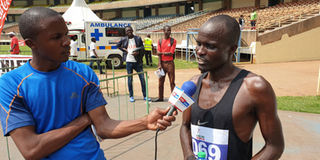Athletes worried as Kenya flops again over 10,000m

Edwin Soi (right) speaks to journalists after winning the men's 10,000m during the Athletics Kenya National trials fro the African Games at the Moi International Sports Centre, Kasarani on June 22, 2019. PHOTO | AYUMBA AYODI |
What you need to know:
- Tanui said that the urge for riches in road racing and lack of interest in track events have left Kenya vulnerable.
- “We only come in during the events to see who is running where when we don’t know what these athletes are going through.
Kenya’s failure to medal in the men’s 10,000 metres final at the African Games in Rabat on Tuesday night once again revisited the question on why the country is doing so poorly over the distance.
Tuesday’s performance, in which 2008 Beijing Olympic Games 5,000 metres bronze medallist Edwin Soi was the best-placed Kenyan in fourth (28 minutes 05.70 seconds) sent out jitters in the Kenyan camp, especially with the IAAF World Championships beckoning in Doha next month.
Just like at the Olympic Games, Commonwealth Games, World Championships and Africa Championships, the drought in the men’s 10,000m continued unabated in Rabat.
Once again, it was the Ethiopians who ruled the roost when Berehanu Wendemu won the race in 27:56.81 with compatriot Jemale Yimer Mekonnen settling for bronze in 27:59.02.
Aron Teklu from Eritrea stole the silver in 27:57.79.
The return of Soi from a long lay-off to make the team and finish fourth as world 10,000m bronze medallist Paul Tanui and Charles Mneria failed to finish the race sends a grim picture of just how bad things are.
Kenyan men are yet to win the African Games 10,000m title since Josphat Machuka’s double in 5,000m and 10,000 at the 1995 games in Harare which followed Thomas Osano’s and Paul Koech’s feats in 1991 (Cairo) and 1987 (Nairobi), respectively.
Ethiopians have dominated, save for the 2007 games.
Charles Kamathi gave Kenya is last World Championships’ 10,000m gold at the 2002 Edmonton event, which came almost a decade after Paul Koech and Moses Tanui had claimed the honours at the 1987 (Rome) and 1991 (Tokyo) championships, respectively.
Kamathi and Tanui fear the drought shall continue for many years to come if Kenya’s approach to many issues won’t change.
Kamathi says that many long distance runners from Kenya fear speed work in their training and rarely do they engage in 300m, 200m and 150 dashes in their programmes.
“We are all good in pacing in both 5,000m and 10,000m, but we wilt in the last lap, letting Ethiopians, who do sprints and lot of hill work, win,” said Kamathi on Wednesday.
“We have talked about falling into our enemies’ hands through pace making and falling in our kick but we haven’t addressed them accordingly.”
Kamathi pointed out that Eliud Kipchoge and Benjamin Limo won the World 5,000m titles at 2003 Saint-Denis and 2005 Helsinki owing to their powerful finishing kick in the last lap.
“Our Kenyan athletes are doing 57 to 58 seconds in the last lap while Ethiopians and Briton Mo Farah has been doing 52 to 53 seconds… that is the difference,” said Kamathi.
Tanui said that the urge for riches in road racing and lack of interest in track events have left Kenya vulnerable.
“We only come in during the events to see who is running where when we don’t know what these athletes are going through.
“You can’t leave your tea plant to grow into a bush and expect yields,” said Tanui.





